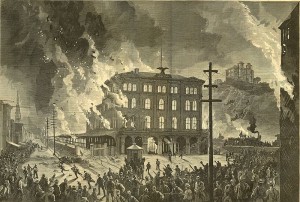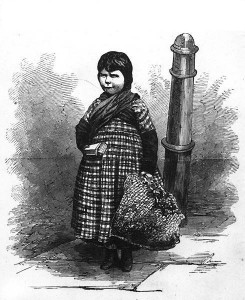
"The newly arrived class, among whom incendiary fires occur, contains many people who are ignorant, filthy, dishonest and little appreciative as yet of American ways and American law."
There were many different reasons why people set fires during the 1890s, and the scary results didn’t always bring out the most enlightened responses from reporters at the Brooklyn Daily Eagle, as the following quartet of pyromania-related articles prove.
••••••••••
“The Firebug, Zucker” (December 29, 1896): “The conviction of Zucker, the firebug, and his likelihood of serving the state in prison for the rest of his days, will tend to restore a measure of public confidence. There have been quite too many fires of late. They have a way of breaking out in places that are insured, and insured to at least the value of their contents. In order to avert suspicion themselves, some of the people who set fire to their shops and tenements have deemed it wiser to hire the work done by others, and Zucker, with some confederates made this his business. It is believed that he made $200,000 out of his fees for starting fires and out of his share of the insurance that was paid on burned buildings. The newly arrived class, among whom incendiary fires occur, contains many people who are ignorant, filthy, dishonest and little appreciative as yet of American ways and American law. The conviction of Zucker must serve to them as a warning and deterrent.”
••••••••••
“A Boy Firebug” (April 29, 1899): “The most youthful prisoner ever accused of the serious crime of arson in Queens County was arraigned to plead to an indictment before County Judge Moore to-day. The accused is George Spillett, 15 years old, of Flushing, L.I. He pleaded guilty to a charge of arson in the third degree, when he admitted that he had set fire to a barn in College Point several weeks ago. Young Spillett was caught redhanded with the torch in his possession after he had ignited a bundle of straw. The boy has been acting queerly for a long time past and it is believed that he is somewhat demented. About a year ago he was arrested for stabbing a playmate named Joseph Schuester during an altercation, but escaped punishment.”
••••••••••

"The girl is now under arrest, after having admitted that she set fire to the house no less than nine times, the last fire resulting in the complete destruction of the interior." (Image by Henry Mayhew.)
“Is the Little Firebug Mad?” (January 7, 1895): “The mystery surrounding the series of fires in the house of Adam Coldwell, at 84 Guernsey street, has been explained by the confession of Rhoda Carlton, the 14 year old daughter of Mrs. Coldwell, by a former marriage. The girl is now under arrest, after having admitted that she set fire to the house no less than nine times, the last fire resulting in the complete destruction of the interior, so that the family is now homeless and dependent on the charity of neighbors for shelter.
The girl made a full confession to Captain Rhodes of the Greenpoint police yesterday. She said that she was tired of living in the house and thought she could frighten her family into leaving. She said that she was not happy at all. The girl, who is not bad looking and is rather large for her age, cried as she told how she dropped lighted matches behind the wall paper and in the bed clothes.
Rhoda cried a great deal in court and when asked why she had started the fire she wailed: “I don’t know. I don’t know. I want to see my mamma.”
••••••••••
“A Peculiar Case” (July 14, 1898): “The Fire Marshal is to-day conducting an investigation into the circumstances attending a peculiar case of alleged arson which occurred yesterday in a two story frame house at 369 South Fifth street, in the Eastern District. The house is occupied by Mrs. Rose Gavin, her son, Isaac Morris, a bartender, his wife, Mrs. Antoinette Morris, and her niece, Annie Mitchell. Mrs. Morris has two children, one of whom died lately. Several years ago she met with an accident, injuring one of her legs. The wound proved intractable and since then it has been necessary to place the patient under the influence of ether no less than eighteen times in order that pieces of the putrefied bone might be removed from the limb without pain. Latterly it has been noticed that the injury and incidental worry has been affecting Mrs. Morris’ mind.
At the Bedford avenue station Mrs. Morris loudly protested against the charge of arson preferred against her. ‘As God as my witness,’ she said, ‘I am innocent of this charge. For a long time my mother has been acting in a strange manner toward me. I wish I were dead.'”
••••••••••
Tags: Adam Coldwell, Annie Mitchell, Captain Rhodes, County Judge Moore, George Spillett, Isaac Morris, Mrs. Antoinette Morris, Mrs. Coldwell, Mrs. Rose Gavin, Rhoda Carlton, Zucker
